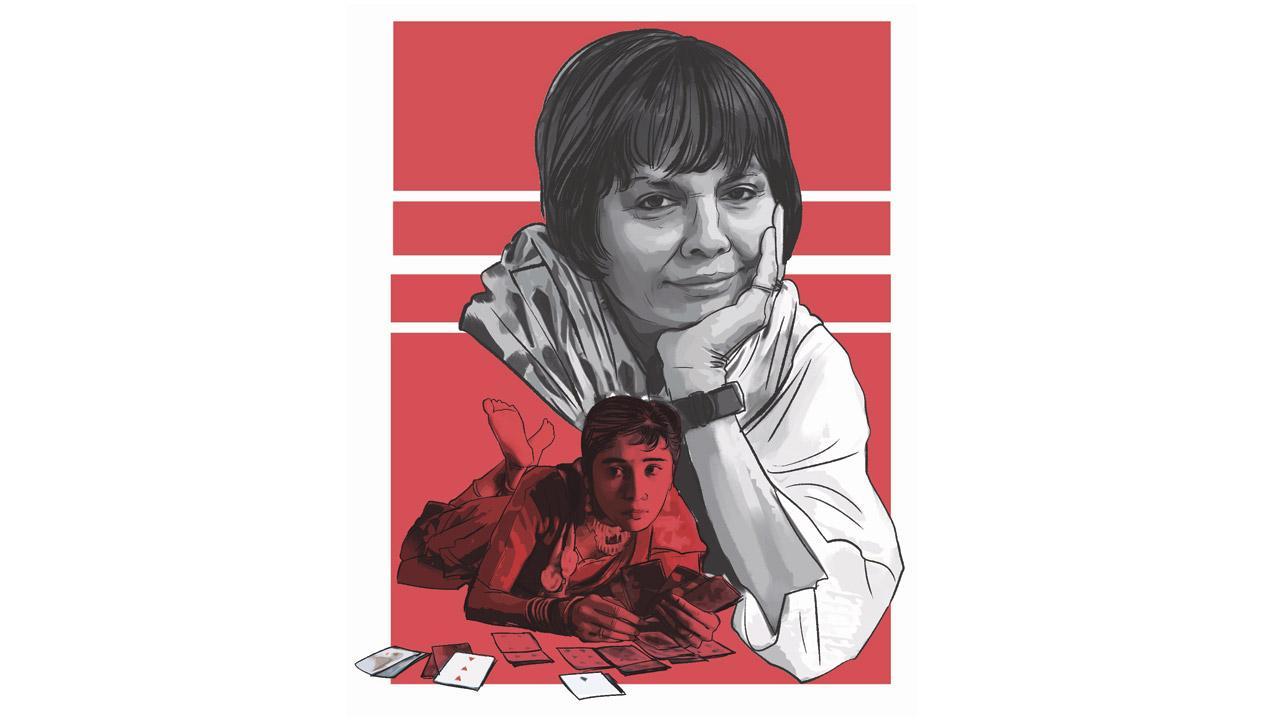Writer-director Sooni Taraporevala (Salaam Bombay! Mississippi Masala, The Namesake, Dr Babasaheb Ambedkar, Yeh Ballet) is an Academy (Oscar) member.

Illustration/Uday Mohite
![]() What! A third column on one book? Yep, first time in eight years of writing this weekly column that I’ve chosen to do this. It’s because Anubha Yadav’s revelatory book, Scripting Bollywood: Candid Conversations with Women who write Hindi Cinema, combines three great lifelong passions of mine—film, women’s perspectives and writing. Yadav has interviewed 14 women Hindi film writers—Shama Zaidi, Sai Paranjpye, Juhi Chaturvedi, Honey Irani, Sooni Taraporevala, Tanuja Chandra, Sabrina Dhawan, Kamna Chandra, Kalpana Lajmi, Urmi Juvekar, Bhavani Iyer, Shibani Bathija, Devika Bhagat and Sanyuktha Chawla Shaikh for the book, published by Women Unlimited, an associate of Kali for Women, Rs 675.
What! A third column on one book? Yep, first time in eight years of writing this weekly column that I’ve chosen to do this. It’s because Anubha Yadav’s revelatory book, Scripting Bollywood: Candid Conversations with Women who write Hindi Cinema, combines three great lifelong passions of mine—film, women’s perspectives and writing. Yadav has interviewed 14 women Hindi film writers—Shama Zaidi, Sai Paranjpye, Juhi Chaturvedi, Honey Irani, Sooni Taraporevala, Tanuja Chandra, Sabrina Dhawan, Kamna Chandra, Kalpana Lajmi, Urmi Juvekar, Bhavani Iyer, Shibani Bathija, Devika Bhagat and Sanyuktha Chawla Shaikh for the book, published by Women Unlimited, an associate of Kali for Women, Rs 675.
Writer-director Sooni Taraporevala (Salaam Bombay! Mississippi Masala, The Namesake, Dr Babasaheb Ambedkar, Yeh Ballet) is an Academy (Oscar) member. She supported herself while studying film and photography at Harvard, by working as a cocktail waitress and even as a security guard. Her very first film script for Salaam Bombay! directed by Mira Nair, won an Oscar nomination and won the Camera d’Or at Cannes. Her one mantra for good dialogues is good research: when researching for Mississippi Masala, she travelled around the American South, went to Africa, returned to Mississippi, and then wrote the dialogues.
Writer Sabrina Dhawan’s (Monsoon Wedding, Kaminey, Ishqiya) very first screenplay, Monsoon Wedding, won the Golden Lion at the Venice Film Festival for director-producer Mira Nair. Raised in Delhi, Dhawan is Professor and Head of Screenwriting at NYU/ Tisch School of the Arts in New York. In Monsoon Wedding, “the niece, Ria, played by Shefali Shah, is based on me, and the revelation about sexual abuse is autobiographical. However, I didn’t get the happy ending shown in the film, I guess it was my way of coping through fantasy… Writing about it helped me take back my power,” she says.
Commenting on the female gaze, she says: “The female characters in Vishal Bhardwaj’s screenplays are always fading; I have fought for them to have a voice and agency. When I got the draft of Ishqiya, which Abhishek Chaubey and Vishal had initially written, the two male characters (Naseeruddin and Arshad Warsi) were driving the story. Vidya Balan (Krishna) was just reacting to situations and was the object of their lust. The big change I brought was to show that it was she who was playing them.” Wow, I didn’t know. She also adds that in the US, she’s part of a union that protects the writer’s credit and their entitlement to residuals, royalty, net profit participation, health insurance and retirement benefits.
Writer-director Tanuja Chandra (Zakhm, Tamanna, Sangharsh, Dushman, Dil Toh Pagal Hai, Qarib Qarib Singlle) is objective about her work: “Tamanna was closer to my own sensibility than Dil Toh Pagal Hai (DTPH)… [but it] was tougher for me to write, because I had to dig deeper into my heart and mind… I had to walk around in dark areas. DTPH was frothier.”
Among the few politically fearless women writers, Urmi Juvekar’s (Darmiyaan, Oye Lucky! Lucky Oye!, Shanghai, I Am, Leila web series) Shanghai, based on the Greek novel Z by Vassilis Vassilikos, “emerged out of the despair that you cannot make political films any more; you cannot make people feel miserable.” She reflects, “There is no cinema for women. In Bollywood, women-oriented cinema is either parallel cinema or middle cinema, never commercial… More than focussing on women, we need a nuanced portrayal of men, which only women can do.” She’s been Head of Development and Production with NFDC Screenwriting Labs for eight years, and says, “I never judge a script by simply reading it; you have to hear the script. Audio is the closest a writer can ever get to cinema. That was the big discovery I made at Binger [screenwriting programme in Amsterdam].” Yadav notes that Juvekar won a landmark judgement in the Bombay High Court after she sued CNN-IBN for plagiarism via the Screenwriters’ Association. And also that a #MeToo incident on set disturbed Juvekar so much, she moved to making documentaries instead for a while. The book is packed with these rich insights. Now, if only someone would do a book on women screenwriters in all major Indian languages, we will finally understand how much women have actually shaped Indian cinema.
Meenakshi Shedde is India and South Asia Delegate to the Berlin International Film Festival, National Award-winning critic, curator to festivals worldwide and journalist.
Reach her at meenakshi.shedde@mid-day.com
 Subscribe today by clicking the link and stay updated with the latest news!" Click here!
Subscribe today by clicking the link and stay updated with the latest news!" Click here!








